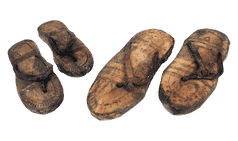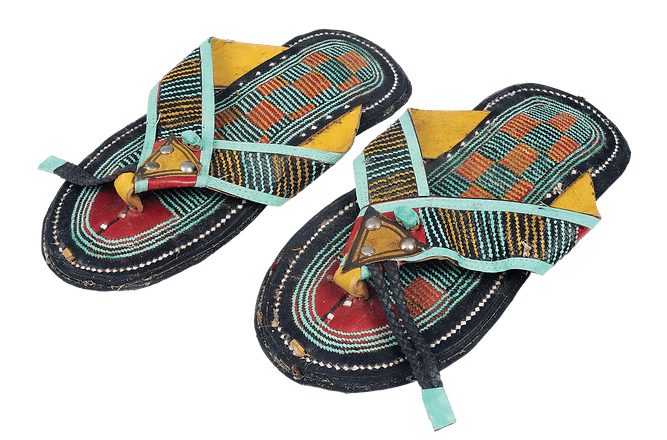Presented by Museum of the Peace Corps Experience and American University Museum
Kanembu people, mid-twentieth century
Lake Chad Region, Chad
Wood, goatskin, dimensions variable
Collection, Museum of the Peace Corps Experience
Gift of John Hutchison, Chad, Doum Doum 1966–68

Advised by my neighbor and host farmer, El-Hadj Mbodou Wuli, I purchased the Kanembu wooden desert sandals in the village market. The sandals are called kawal or kafal in the Kanembu language. They are designed for walking in the sand around Lake Chad. Once you purchase the carved wooden base, you head to the leather worker to get goatskin straps sewn into the sandals. They are tailor-made to the size of the owner’s feet.
Mbodou Wuli informed me that with desert shoes, one can walk on top of the sand, like the camel, rather than sink into it. The shoe is designed to emulate a camel’s foot: the shape of the sole and the edge around it keep the sand from slipping out around the sides. Mbodou Wuli knew about walking in the desert—he had performed his Islamic pilgrimage to Mecca and back to Chad on foot. He walked for almost three years to accomplish this. Mbodou Wuli earned his El-Hadj title the hard way.
The fact that I have given the rest of my life to a career in and about Africa is linked to my friendship with El Hadj Mbodou Wuli. He was the muezzin of the village. His house and the mosque were near my straw-hut compound, and I woke up every day to his morning call to prayer. He showed me the ingenuity necessary to thrive in an environment that can be extremely menacing and challenging.
Mbodou Wuli shared a portion of his farm with me and I made a demonstration vegetable garden. Each morning we would get up early, put on the kawal shoes, and walk the three, sandy kilometers to the farm. His wife would bring a polenta-like meal made from millet with vegetables, beans, and sometimes even a meat sauce. We would eat the midday meal together in the shade. After some rest, and more work, we put our kawal shoes back on and walked back home in the kati (sand).
I was not able to change the world, and my desert shoes are all worn out now. However, my friend El-Hadj Mbodou Wuli changed my life forever. He was a most remarkable man.

SUKA DUBU
Tuareg people, mid-twentieth century
Niger
Leather, beads, 2 1/2 x 4 1/2 x 10 1/2 in. each
Collection, Museum of the Peace Corps Experience
Gift of John Hutchison, Chad, Doum Doum 1966–68
The Committee for a Museum of the Peace Corps Experience is a 501(c)(3) private nonprofit organization. Tax ID: EIN # 93-1289853
The Museum is not affiliated with the U.S. Peace Corps and not acting on behalf of the U.S. Peace Corps.
Museum of the Peace Corps Experience © 2024. All Rights Reserved.